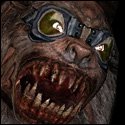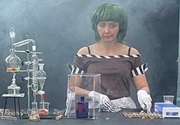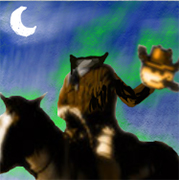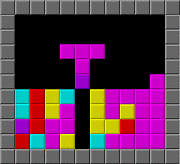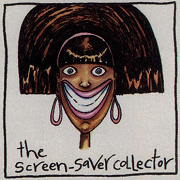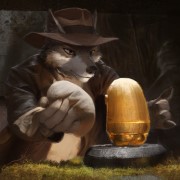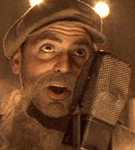|
i dunno how you make a horror game outside of the storytelling though. a system can't really make something horrifying. you can put in insanity points or corruption points or make things more lethal but it doesn't make anything spooky.
|
|
|
|

|
| # ? Jun 5, 2024 08:20 |
|
juggalo baby coffin posted:i dunno how you make a horror game outside of the storytelling though. a system can't really make something horrifying. you can put in insanity points or corruption points or make things more lethal but it doesn't make anything spooky. 10 candles? You play in the dark and blow out candles as you go
|
|
|
|
Dread is the other horror game I see brought up a lot, using a Jenga tower as an escalating tension mechanism, whenever it collapses someone dies.
|
|
|
|
FFT posted:Thank you.
|
|
|
|
Froghammer posted:You're the person in this analogy claiming that the magic stone was a good soup ingredient to begin with I think they're saying that there's soup with meat and carrots, and you're removing the meat.
|
|
|
|
Repping Dungeon Worlds for a generic easy fantasy system which rewards non-combat strats just the same (because the DM has to come up with everything)
|
|
|
Froghammer posted:You're the person in this analogy claiming that the magic stone was a good soup ingredient to begin with FFT posted:I was thanking you for the apt metaphor, not "acknowledging" D&D has no flavor of its own yeesh Relax.
|
|
|
|
|
This thread is like the soup that comes out when I eat a ton of spicy food then go for a run.
|
|
|
|
FFT posted:It's sci-fi like Star Wars is sci-fi, in that it isn't but has some of the trappings No, it's really not. Spelljammer very intentionally and specifically avoids the trappings of science fiction and instead uses the trappings of high fantasy. That's why your ship has sails. That's why it's powered by a magic shunting throne. That's why you travel across a flammable medium imagined by people who had trouble with the idea of a void in God's creation. That's why the bad guys are orcs just spelled backwards. I don't mean to be a pedant, but since the last few pages have been arguing about whether D&D can do genres other than D&D high fantasy, I think we should try to be clear about genre. And man, if you think Spelljammer is sci-fi, you're maybe not the best judge of what kinds of genres D&D can actually do.
|
|
|
|
Star Wars is not sci-fi. https://twitter.com/wizards_dnd/status/1214646985065500672?s=21
|
|
|
|
Space Fantasy is the term I've always applied to Spacejammer and you could probably put it on Star Wars if you want but I'd more likely call it soft sci-fi.
|
|
|
|
|
FFT posted:Stop adding extra qualifiers and pretending they're the point being attempted. Can D&D be a vehicle for horror? Yes, obviously. I wrote an essay that basically agrees with this position but thanks for the naked hostility I guess.
|
|
|
|
I think we probably should try not to spend the next four pages arguing about whether Star Wars is sci-fi or fantasy, which is one of the only arguments likely to be dumber and more contentious than "is Dungeons & Dragons a good game" with the added bonus of being almost entirely off-topic (but it's close enough to fantasy that you could run a good Star Wars game in Dungeons & Dragons without changing anything but class, item, and ability fluff)
|
|
|
|
but could you run a horror Star Wars campaign in D&D
|
|
|
|
No. 1 Apartheid Fan posted:I think we probably should try not to spend the next four pages arguing about whether Star Wars is sci-fi or fantasy, which is one of the only arguments likely to be dumber and more contentious than "is Dungeons & Dragons a good game" it's not an argument though, everyone in this thread seems to hate it
|
|
|
|
Syrinxx posted:but could you run a horror Star Wars campaign in D&D Apparently?
|
|
|
|
Forget space ships, I want a D&D Space Jam
|
|
|
|
Gharbad the Weak posted:Forget space ships, I want a D&D Space Jam There’s a great PbtA game about wrestling and now I really want one for Space Jam / NBA Jam. Or NFL Blitz RPG.
|
|
|
|
Saying Star Wars isn't science fiction is dumb nerd pedantry left over from the days when you had to pick between being a -Trek or -Wars fan and fight over it. Arguing over whether or not it is science fiction is just more dumb nerd pedantry that's entirely besides the point. The point is Spelljammer is doing everything it can to not feel or look like science fiction.No. 1 Apartheid Fan posted:(but it's close enough to fantasy that you could run a good Star Wars game in Dungeons & Dragons without changing anything but class, item, and ability fluff) Y'know, after playing in some very successful D20 SW games using both the revised and Saga editions and then switching to WEG's old D6 rules, I don't think you can run a *good* Star Wars game in Dungeons & Dragons. You can run a fun game with the trappings of Star Wars. You might even tell a really interesting Star Wars story like KoTOR 2 attempted to, but you're not going to capture the pacing and feel of the films and shows.
|
|
|
Kaysette posted:There’s a great PbtA game about wrestling and now I really want one for Space Jam / NBA Jam. Or NFL Blitz RPG. I'd love to play PbtA at a table with a GM experienced in the system but my only experience was with a table of primarily D&D players and none of us really managed to get our head around how the wound system worked before we moved to a different system and campaign(I was also one of only two with prior experience with Lankhmar as a setting which didn't exactly help)
|
|
|
|
|
Can you possibly less self-aware than accusing something being dumb nerd pedantry while posting in the Dungeons & Dragons thread?
|
|
|
|
Give us a page and find out
|
|
|
|
|
Splicer posted:This is the second most wrong thing ever said in this thread. You are now confusing "setting" with "genre." But since we obviously mean radically different things by the same words, it seems pointless to argue about this further. My favorite systems invite players (and characters) to come to specific realizations about the cosmology of the world the game is set in through analysis of how the rules work. None of the D&D systems have ever supported anything like that except as an attempt at satire. PaybackJack posted:D&D you min/max your stats so you can game the system to get the largest bonus you can to the numbers that matter to your class. Were you here for the big argument about rolling stats randomly versus the point generation system? You know, the thing that makes it much more difficult to game the system? (Or, for that matter, the discussion of how Mind Flayers are bullshit because they target INT saves and INT is the 5E dumpstat?) For that matter, 5E does not require you to optimize your character. Torchlighter posted:Alright, We're gona have talking about it. I am unsure how my statement that you can do horror without changes to the system, but with restrictions to it, gets translated into "5E is a fine generic system because you can do horror with no restriction." Firstly, I never called it a fine generic system. As generic systems go, D&D is pretty lousy and manages through a combination of being an early system that (with the exception of 4E) later editions try to remain like, and through being sufficiently archetypical that it can still largely be seen as the default RPG system. There's no underpinning to the design to explain why it works the way it does. That's true of many of the early systems, though: even d100 Call of Cthulhu struggles to explain why it can be so hard to succeed at things. Secondly, I specifically said that you have to place restrictions on the system to make horror, low fantasy, no magic, and the like function properly. Start with L1 5E characters and restrict classes in the campaign to Barbarian, Fighter, Monk, and Rogue. Any NPC with magic is creepy or worse; there's no magical healing or way to remove things like charms or curses or conditions, and death cannot be overcome. A pack of six ordinary wolves is a TPK. That's not how I'd actually handle the horror, but the system would clearly support dread and combat would be sufficiently lethal. And you can clearly see how changes from 4E to 5E help produce that level of danger, because 4E healing surges (for example) make combat less lethal in comparison and easier to recover from. As for insisting that a generic system that permits you to play a "horror" campaign must somehow have specific horror mechanics, completely independent of atmosphere or story? I am dubious that such a disconnection can work. If you don't get nervous about your character failing the save against ghoul paralysis and ripped to shreds, how is blowing your Sanity check when seeing Cthulhu going to somehow be better? Can you provide a concrete example of a generic system that you think specifically supports horror through its mechanics, independently of things like RP? Splicer's example of Dread doesn't work for me because it is not generic, and because it is a one-shot system. If my character dies at the end of the session anyway, why do I care about pulling from the tower? All I would have to do is chant "Jenga, jenga, jenga" every time I resolve an action to undercut the effect. Horror campaigns are among the most sensitive to player buy-in, especially because humor has a key role to play in developing effective horror over anything more than a single-session adventure, but it has to be handled very carefully. Framing the pull from the Dread tower properly does indeed get the adrenaline pumping. But I've seen eight grown adults in a room standing at a table watching one of them roll a d20 with huge suspense and a big celebration when that saving throw succeeded, because its success or failure determined not just the success of that session, but of a world-saving quest involving over two years of play in real-time. High stakes with a genuine chance at failure are at least as important to building suspense as the right random number generator. So Dread has the advantage because you wouldn't agree to play Dread for a horror one-shot and then undermine the horror unless you are an rear end in a top hat, but what has that to do with 5E's capacity to operate within a wide range of possible genres? I'm just wrapping a campaign testing that modular character-building system I posted earlier in the thread. The PCs are L15 and massively more effective than PCs in the ordinary system, partly because of rewards they've received and partly because of the utility of the modular system. I ran the four-person party at L13 in an escort mission against a CR 20 legendary opponent with lair actions. When they decided they couldn't escape from it, they did 300 hp of damage in under three rounds and drove it off. From a pure statistical standpoint, it was not a threat to them sufficient to produce a TPK (and neither were the two Shoggoths they encountered). But it was a threat to kill the thing they were escorting, and more to the point, based on what they saw it do they did not KNOW that they could handle it. Similarly, the Shoggoth stats told me that at worst, it might force them to spend the components for a Revivify spell or two. But they didn't know those stats, and getting lots of damage and then swallowed was sufficiently frightening to force them to expend some big spells and abilities killing it dead as rapidly as possible. So what was I doing? Using the system to heighten fear? Heightening fear despite the system? Was the system completely unconnected with their responses to the situation? I would argue that I was exploiting specific elements in the system to heighten the fear effect: the Shoggoth, for example, had attacks that hit multiple PCs at the same time and dealt big damage (a third of the target's hp or more), while being resistant to a wide range of attacks and having a goodly amount of hp and good chances to hit. They knew that if they fought it, they had to kill it fast to avoid a potential TPK, but they didn't know whether they could kill it fast enough. Conversely, the CR 20 opponent did much less damage but looked terrifying and had a "teleport and attack" ability that posed a real threat to the escort; it was dangerous for tactical reasons, although also for its ability to open gates and bring more Shoggoths into the fight. Now I'm running a fantasy game with Cthulhu Mythos elements and some horror, but it's mainly optimistic and heroic. I wouldn't classify the campaign as good solid "horror", but I would say that D&D provides plenty of tools that can be adapted for a horror campaign. That those tools will work in many systems doesn't mean that they don't count. I'm not saying D&D is uniquely suited to horror adventuring. No generic system is. That is part of what makes them generic. There's clearly an underlying mismatch in how people comprehend systems versus games that's at work in the thread. I suspect some people would fervently insist that the system IS the game, and others would insist that it is only part of the game and maybe not the most important part. I also suspect that many of the other big arguments in this thread stem from that fundamental disagreement. Let's state the point another way: Dread is a bad RPG system to use to play high fantasy, because Dread is not a generic system, it's a horror system. If you want to run a campaign set in the mythological Trojan War of Homer, neither Traveller nor Deadlands are going to be a good choice of system for you. 5E is sufficiently generic that you could use it for a Trojan War campaign, and you probably want clerics but may not want sorcerers or wizards in that instance. And yes, FATE is probably a better choice than 5E for that Trojan War campaign. That doesn't mean 5E is not a generic RPG. Narsham fucked around with this message at 03:02 on Jan 8, 2020 |
|
|
|
So, would we represent the Monstars increased jamming abilities via lair actions? I feel like you need to give them an edge, since the players they robbed basketball skills from were pretty good.
|
|
|
|
Could we start with reverse-engineering Barkley, Shut Up and Jam: Gaiden for the table top?
|
|
|
|
Narsham posted:5E is unquestionably independent of setting. Taking it back to the beginning, far from being unquestionably independent of setting there are few systems more setting limited than non-4e D&D. Call of Cthulhu, Marvel Heroic Roleplaying, Marvel Superheroes (FASERIP) and even The One Ring I consider more setting-independent than D&D 5e because of how both eclectic and pervasive the magic system is. (And yes, those systems were deliberately chosen because they are tied to specific settings) quote:Is it independent of genre? Not precisely. But you can do horror, high fantasy, low fantasy, and no magic without any actual changes to the system, only restrictions. This applies in exactly the same way you can cut down a large tree with kitchen knives. Sure you can but it's really using the wrong tool for the job and makes you work harder than you otherwise would, to worse effects than you otherwise would. One of the features that makes D&D D&D is how utterly inconsequential the violence is. In most RPGs being hurt actually gets in your way, applying wound penalties. In D&D you are fit as a fiddle on 1hp, taking no penalties to any skill. It's either that, dying, or dead. Meanwhile in most other systems you take progressive wound penalties and healing is a whole lot harder. Thus you need to be a lot more careful with the violence even if you won't get caught. You also have bags of hit points - in canon Geralt of Rivia came closest to dying from a peasant with a pitchfork; never happens even on a crit with a mid level fighter. As for "no magic" and D&D, if we ignore 4e roughly 40% of any PHB is spells, so tear that part out. Then we look at the classes. Fighters are fine - for two subclasses (but not the Eldritch Knight). Rogues are fine - for two subclasses (but not the Arcane Trickster). Barbarians are fine for the Berserker and most of the Totem Warrior. And Monks are fine up to level 12 for the Way of the Open Hand (but forget the other two). And literally every other class is a spellcaster. And then there's the classic question "What is a hit point?" and "where does this level of resilience become supernatural". Four classes, all limited doesn't leave you that much. Then we move on to low fantasy and it gets worse. This is because D&D magic is such an extraordinarily specific thing. Let's try using one of the classic D&D settings - Dark Sun. Here you're fighting tooth and nail against D&D's model of prepared, risk free magic because the writers who made it wanted magic to drain the land around you and be something that tempts the wielders (a temptation that gets bigger the riskier the situation). AD&D 2e handles this badly despite being a 2e setting (by creating extra wizard classes for defilers and preservers), whereas 4e is much more elegant. 5e has nothing. Or let's try Jack Vance's dying earth where elite mages have maybe half a dozen spells - and that's literally the system that the D&D magic system is named after. Or Tolkein's Middle Earth (Lord of the Rings) - in which Gandalf himself was only a fifth level magic user (or more accurately D&D is simply a bad fit). Or Terry Pratchett's witches with headology and wizards avoiding attracting the Dungeon Dimensions. Or the Warhammer Fantasy risk/reward magic system. And then there are cases where you want magic to be rituals rather than combat magic that can be thrown out in six seconds. Or in short spell slots and levels with risk-free predefined spells are detailed enough that for most fantasy, high and low, you have to not just throw out the 40% of the PHB that is spells, the eight out of twelve classes that are based round spellcasting, and the three or four remaining subclasses that are casters (the shadow monk is not no magic but works as a fantasy ninja so you can probably leave it) but re-write most of them heavily And then we come to horror. Remember that I mentioned inconsequential wounds earlier? This is a problem for horror. If wounds are consequential the monsters become a lot scarier than if there are basically two states: alive and dead. All you lose is this number and the GM probably doesn't want to kill you. Other than that there are few consequences (and nothing like level drain/energy drain in the system or Call of Cthulhu's sanity system). And the risk free magic again doesn't fit with horror. Also the D&D equipment system is ... unusual for a horror setting other than as a change of pace. There is no part of the D&D ruleset that actively supports horror and a number, as I've mentioned that get in the way. And when you have to tear out the magic system and either scrap seriously overhaul at least eight out of twelve classes, and then fight against the hit point and combat systems what's left? 5E D&D's amazing skill system? quote:You’d have to rework the class system to do anything else with it, but that is extremely easy compared to some systems (Exalted, Shadowrun) though not as easy as a built-in like BRPG or FATE. From my memories of Shadowrun I'd argue that. Although Exalted is one of the very few systems I'd agree with you for. But it's a pretty extremely locked system. quote:I am guessing that we also have sharply different definitions of “system.” Or possibly independent.
|
|
|
|
Why are you all talking about horror and D&D? Of course horror doesn't work in D&D, it doesn't work in tabletop games at all.
|
|
|
|
Kaysette posted:Star Wars is not sci-fi. Nintendo Direct got em shook.
|
|
|
|
Kaysette posted:Could we start with reverse-engineering Barkley, Shut Up and Jam: Gaiden for the table top? You know... It could probably handle importing Shaq-Fu pretty well as a start.
|
|
|
|
Gharbad the Weak posted:Oh, is that what you guys meant? I was looking for furniture.
|
|
|
|
FFT posted:No one's saying it's only possible with D&D or even that D&D is particularly special in this regard. Trojan Kaiju posted:I'm guessing this is directed at me? To be clear, my idea is 1) just idea tossing that is tangential to but not really part of the "is 5e right for this" and 2) just a scenario, not a campaign pitch. I personally feel like magic is a major part of D&D and while experimenting with low or no magic is probably doable, I wouldn't do it. However, like I said, anti-magic areas are A Thing and disempowering players to hit certain beats is a valid strategy, though that expectation needs to be set beforehand in a system like D&D where the initial expectation is empowerment. Splicer fucked around with this message at 12:49 on Jan 8, 2020 |
|
|
|
I've tried Dread a couple of times. Neither time did I feel particularly worried, or feel any kind of real tension. Maybe it was the person running the game, or the lack of a connection to the character. But it just wasn't... Horror. Wasn't scary, or unnerving or anything like that. Whereas I've had those feelings with 5e. I think the people saying it's wholly dependent on the GM is right. The main issue is the thread (in general) has a bad habit of being extremely hostile to any opinion which isn't "D&D is bad now" which is really damned annoying for what's supposed to be the thread for the latest edition. People will be downright rude and even mean to one another just because they've got different opinions about the game. And I've tried to branch out into other systems! I love Shadow of the Demon Lord, even if it has its own problems (caster supremacy reigns) but I can't for the life of me get anyone to try to play it. They don't WANT to learn a new system, period.
|
|
|
|
I feel like I made it pretty clear in my thesis length diatribe that the issue is much more nuanced than 'D&D bad' and 'horror not possible in this game system.' The issue with nuance is that you have to recognize the many different questions being asked of essentially the same argument. System is itself fairly complicated; D&D's system is very closely married to its setting because classes are the primary unit by which mechanics are granted to players - but it would technically be possible to divorce system from setting. D&D's setting and writing and artwork etc isn't really conducive to most people's understandings of horror (though it is extremely conducive to Castlevania, so you know, grain of salt there). Settings and systems are not agnostic; they convey information about tone and agency and themes in ways that are often quite subtle and can be ignored if you want to badly enough but unless you've really dissected and thought about their design may not be very persuasive. Can D&D make you feel the way a horror story makes you feel? Of course it can. A sufficiently skilled storyteller can tell any kind of story they want, though they'll probably have a much easier time of it if they aren't delivering their story from a megaphone atop a pile of phonebooks or whatever. I can't make your DM good; I can't give advice that will take a neophyte DM from 'I've never done this before' to 'master of suspense', whereas someone who owns a copy of the PHB and has watched a couple of Youtube videos can probably run a mediocre to good dungeon crawl. I wonder why that is? It is not my aim and I hope not the aim of anyone else in this thread to tell anyone that you can't or even shouldn't use D&D in this way or that; but once the question arises, 'is this system good for blank' then yeah, we're going to talk about the system and what it's good for. 'Maybe systems are irrelevant. Maybe design is completely abstract and all that matters is the story you tell' kind of misses the point of the question.
|
|
|
|
i think the problem is that horror is entirely dependent on the storyteller. you can't really make a scary pnp game. you can have a system with a bunch of rules for your character being scared, but that's a different thing entirely. you can write a game so characters are vulnerable and supplies are thin and whatnot, like call of cthulhu, but that just makes things tense rather than scary. it's like how even though most pnp gaming sessions have some good laughs, it is very hard to make a 'funny' system. you can try, but you'll just basically end up with cards against humanity, or in the case of horror, loving lamentations of the flame princess or something. either way you have something that approximates a genre to a certain % of the population, but is mostly just a bunch of dicks and pooping.
|
|
|
|
Narsham posted:You are now confusing "setting" with "genre." My initial post you were replying to was about D&D not having a coherent approach to death. Your argument was that being a generic system means D&D can't have a coherent approach to death. But if we take, as you insist, "generic" to apply only to setting, and we take your increasingly narrow definition of "setting" at face value, then being setting agnostic does not preclude taking a stand on character death and providing mechanics to support same. You can change settings easily while keeping the approach to character death consistent, by your definitions you only need to change how character death works if you also change genre. Or, again, we have very different definitions of the concept of genre. I would not consider ravenloft, dark sun, politicking in faerun, and dungeon crawling in faerun to be in the same genres.
|
|
|
|
Splicer posted:Define "it" lol
|
|
|
|
sebmojo posted:lol e: I'm taking this one on me, I've changed the wording Splicer fucked around with this message at 17:17 on Jan 8, 2020 |
|
|
|
sebmojo posted:lol extremely on brand for this thread
|
|
|
|
Splicer posted:
Ah sorry I thought because of the edit it was responding to a new post and also I apparently don't know how to read.
|
|
|
|

|
| # ? Jun 5, 2024 08:20 |
|
I want to go back six pages into the slapfight and say that I really, really like the idea someone had of starting with a total party wipe, introducing new characters loosely connected to the first and starting a story like that. It's a neat way to set up the stakes, gives out motivation in the form of fear and revenge and lets people power game to their hearts content because holy poo poo that thing is still out there and you just know it's coming back. Basically I want to play half an hour of D&D: Alien followed by months of D&D: Aliens.
|
|
|



